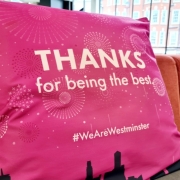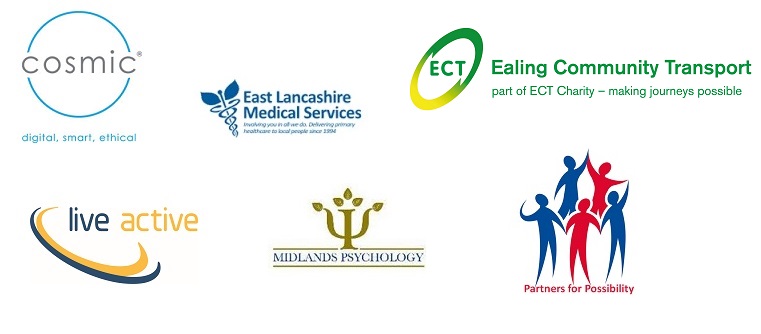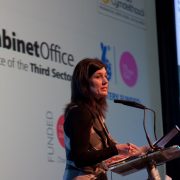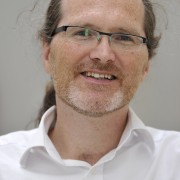This website uses cookies so that we can provide you with the best user experience possible. Cookie information is stored in your browser and performs functions such as recognising you when you return to our website and helping our team to understand which sections of the website you find most interesting and useful.
Posts
The Golden Thread: Embedding social enterprise for better student outcomes
All professional worlds have their own jargon. The term ‘being student-centred’ is an important one for universities, but can be a challenge to achieve for an institution that has so many competing priorities. The increasing politicisation of the university world has also led to challenges around what exactly this term means.
On 25th April 2022, we held our first face-to-face networking meeting as part of a collaboration conference, for two years at the University of Westminster, one of our Social Enterprise Gold Mark holders. It was a really exciting and energetic event. The summary report can be found on our website.
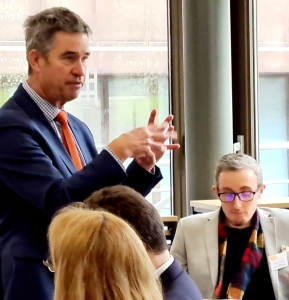 Being more student-centred around social enterprise was a key topic flagged up at the event. Dr Peter Bonfield, Vice Chancellor at University of Westminster said that 1 in 5 of their students go on to set up their own businesses, with many looking to make a difference to society and create a better world. Generational trends show that Generation Z are much more socially and environmentally conscious with many dedicated to fighting social and environmental change.
Being more student-centred around social enterprise was a key topic flagged up at the event. Dr Peter Bonfield, Vice Chancellor at University of Westminster said that 1 in 5 of their students go on to set up their own businesses, with many looking to make a difference to society and create a better world. Generational trends show that Generation Z are much more socially and environmentally conscious with many dedicated to fighting social and environmental change.
Mission and values are therefore of increased importance to students in gaining a higher education. They also want to see evidence of how these are being delivered at all levels of the institution. This is why the social enterprise business model is so crucial. It provides the framework for a business that is creating social and environmental value as its raison d’etre. It links directly into, for example, the delivery the UN’s Sustainable Development Goals (SDGs) and civic responsibilities.
It is not a by-product; it is a state of mind and culture – the Golden Thread.
Findings from our conference show that there is a need to make better connections between the different threads from the student’s point of view, both inside and outside the teaching environment. For instance, extra-curricular activity needs better academic credit as well as making the better links to local social enterprises by bringing the ‘outside in’ through knowledge exchange (KE) activities.
Finance is another area that needs greater connection and thought. Many universities are still not embedding social value with equal emphasis to financial value into their finance modules themselves. This leaves a disjointed approach whereby social value often sits separately in a different function within the institution.
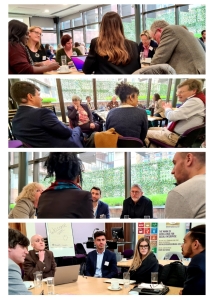 Achieving the right advice and type of funding and support is also a challenge with much start-up funding and support focusing on a narrow base of STEM and high growth companies. Pitching competitions can also act as a barrier as many more socially motivated and marginalised students to not feel confident in this style. We need more links to peer-to-peer lending and support programmes outside the university setting as well as pivoting internal university support (including pump priming and growth capital) to help social enterprises grow sustainably.
Achieving the right advice and type of funding and support is also a challenge with much start-up funding and support focusing on a narrow base of STEM and high growth companies. Pitching competitions can also act as a barrier as many more socially motivated and marginalised students to not feel confident in this style. We need more links to peer-to-peer lending and support programmes outside the university setting as well as pivoting internal university support (including pump priming and growth capital) to help social enterprises grow sustainably.
When a university shows leadership in this area, we see jigsaw pieces come together for students too. There are good examples of how universities, such as Westminster (that hold our Gold Mark) have done this as set out in my joint article with Diana Beech for HEPI.
By making more distinctive links between student’s needs, teaching, the community, research and values, we see the best outcomes for a supportive environment and greater sustainability for all in the longer term.
Managing Director, Social Enterprise Mark CIC
Vote for your winner in Making a Mark competition
The Making a Mark competition is back for a third year!
This annual competition celebrates the vast impact that accredited social enterprises make through their diverse activities, highlighting examples of how accredited social enterprises are creating considerable social impact within their local communities and in wider society and the environment.
We are delighted to announce the below finalists, which we have shortlisted from entries from our network of Social Enterprise Mark/Gold Mark holders, based on the quality of their responses to the social impact questions that are required as part of the application and full review process.
- Cosmic
- Ealing Community Transport
- East Lancashire Medical Services
- Live Active Leisure
- Midlands Psychology CIC
- Partners for Possibility
It is now your chance to have your say, as we open it up to a public vote, which will account for 50% of the final result, with the vote of the Social Enterprise Mark CIC team and independent Certification Panel accounting for the other 50%. The winner will be announced at a special reception at our annual conference (in York) on 6th June 2018.
Voting will close at midnight on Friday 4th May.
Can ‘fairly traded’ really replace ‘Fairtrade’?
 As the authority responsible for implementing the robust standards and independent accreditation processes of the Social Enterprise Mark and Social Enterprise Gold Mark, we were very sad to hear of the decision by Sainsbury’s to apply their own “fairly-traded” scheme to Red Label tea in place of the widely trusted FAIRTRADE Mark.
As the authority responsible for implementing the robust standards and independent accreditation processes of the Social Enterprise Mark and Social Enterprise Gold Mark, we were very sad to hear of the decision by Sainsbury’s to apply their own “fairly-traded” scheme to Red Label tea in place of the widely trusted FAIRTRADE Mark.
Much as Sainsbury’s is loved and trusted by its customers, this move risks opening the door to less reputable businesses creating their own in-house schemes. We are very concerned that this will lead to a proliferation of unsubstantiated social and environmental claims that will confuse consumers and ultimately erode their trust in all such schemes, far beyond the sectors in which Fairtrade operates. The extent of these concerns is apparent in the response to the petition on Change.Org on this topic which quickly attracted over 5,000 signatures.
As a labelling company ourselves, we know that considerable investment, expertise and commitment is required to develop and process robust standards. We are concerned that by Sainsbury’s controlling the certification of its own products, it will ‘water down’ the regulations to suit its own agenda.
There is likely to be confusion amongst consumers, who have come to recognise the FAIRTRADE Mark as independent proof that a product has met international Fairtrade standards. This trust has been built up over 2 decades.
For our part, we verify the claims of genuine social enterprises, by providing a trusted independent label to assure stakeholders that they meet common standards. The assessment process helps them to benchmark performance against the norms and encourages them to work towards best practice. The key to credible accreditation/certification is an external assessment process, which should be conducted by an independent third party. Only with a completely impartial and transparent process is it meaningful.
We therefore fail to understand why Sainsbury’s would choose not to support such a process in respect of its own products that meet Fairtrade standards, rather than upholding the principles of transparency and consistency that the FAIRTRADE Mark provides. This is, I am sure, a sentiment which is echoed by our network of Social Enterprise Mark/Gold Mark holders, and the wider social enterprise sector.
We offer our full support to Fairtrade, which itself inspired our own Mark, and stand by the importance of independent, credible, transparent authentic labels that consumers know they can trust.
Celebrating social enterprises ‘Making a Mark’
Following the success of the Making a Mark competition last year, which celebrated the vast impact that accredited social enterprises make through their diverse activities, we have decided to repeat the competition this year.
The competition highlights examples of how accredited social enterprises are creating considerable social impact within their local communities and in wider society and the environment. We shortlisted the below finalists from our network of Social Enterprise Mark/Gold Mark holders, based on the social impact statements and any relevant reports that were submitted at their most recent renewal.
 Connection Crew
Connection Crew- Ealing Community Transport
- Emmaus Cambridge
- Epic CIC
- South Shropshire Furniture Scheme
- The Big Issue Group
- Warrington Health Plus
In deciding the shortlist, we took account of how carefully Mark Holders have measured their social impact and can show how income has been used to maximise this, and also considered how succinctly they have described their achievements in this regard and what sort of story these tell about the kind of social enterprise they are.
The shortlist went to a public vote, in which over 300 votes were cast. These votes will account for 50% of the final result, with the vote of the independent Certification Panel accounting for the other 50%. The winner will be announced at a special reception at our annual conference (in Winchester) on 5th June 2017.
Celebrating 7 years of upholding the standard for social enterprise
On the 7th anniversary of the launch of the Social Enterprise Mark, I am reminded of how far we have come as a sector in that time, but also of how far we have to go in being truly recognised as competitive, sustainable businesses in the mainstream business world.
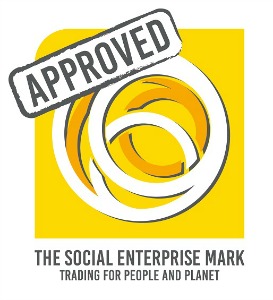 Since our inception back in 2010, Social Enterprise Mark CIC has endeavoured to ensure the social enterprise business model remains ethical, credible and commercial, through independent accreditation. As well as providing a single recognisable ‘identifier’ for genuine social enterprises, which are externally assessed against sector-agreed criteria, we work to promote the capabilities of social enterprises as a credible alternative to more traditional business models.
Since our inception back in 2010, Social Enterprise Mark CIC has endeavoured to ensure the social enterprise business model remains ethical, credible and commercial, through independent accreditation. As well as providing a single recognisable ‘identifier’ for genuine social enterprises, which are externally assessed against sector-agreed criteria, we work to promote the capabilities of social enterprises as a credible alternative to more traditional business models.
This is not easy by any means, especially when it comes to spreading the message to the public and consumers. However, there is clearly a shift change occurring in consumer attitudes towards the sustainability of brands and organisation, as seen in a recent study by consumer goods giant Unilever, which found more than a third of consumers now choose to buy from brands they believe are doing social or environmental good.
We are currently planning a new campaign, which will aim to encourage consumers to consider how they can be sure of the ethical/sustainable credentials of the organisations they buy from. By working with several high profile partners, we hope to spread the message to a much wider audience and to start a global conversation about how consumers can be sure brands are ‘walking the walk’ and not just ‘talking the talk’ when it comes to sustainability and their social purpose.
Another constant challenge is influencing government policy and embedding social enterprise within their mindset. I was interested to see PM Teresa May allude (albeit briefly) to her vision for an inclusive business strategy in the foreword of the government’s Green Paper on the Industrial Strategy: Building our Industrial Strategy. Although there was no direct reference to her recent Shared Society speech, the PM declared that the government wants to “move beyond short-term thinking to focus on the big decisions that will deliver long-term, sustainable success”.
As I wrote back in November in a post looking at the pressures faced by the public sector, tight financial constraints have been resulting in a rather short-term focus, where the bottom line has become of overriding importance, over and above what may be best for society in the long term. Social enterprises are rooted in their stakeholders and communities, and are therefore well placed to respond to the biggest issues facing society. They are set up to address a particular social issue or objective and this remains their driving, primary purpose for the long term – of course profitability is also important for the business to remain sustainable, but profits are used to serve the needs of social stakeholders and feeds back into their social objective.
As we begin our 8th year as the social enterprise accreditation authority, I am confident that we are moving in the right direction to achieving these goals, and look forward to what the next 8 years will bring.
Further expansion of our international network
As a global champion of social enterprise standards and the body responsible for the only internationally available social enterprise accreditation, we are delighted to have recently expanded our international network of accredited social enterprises, representing a five-fold increase within 2 years.
 Network of Asia and Pacific Producers Limited (NAPP), part of the the global Fairtrade organisation, working to secure a better deal for farmers and workers in Asia and Pacific, has recently been awarded the fifth international Social Enterprise Mark. NAPP joins the global Fairtrade certification body FLOCERT, along with AUARA (Spain), C3 (UAE), and Northdoc (Ireland) in the growing network of organisations outside the UK accredited with the Social Enterprise Mark, proving a commitment to trading for the benefit of people and planet.
Network of Asia and Pacific Producers Limited (NAPP), part of the the global Fairtrade organisation, working to secure a better deal for farmers and workers in Asia and Pacific, has recently been awarded the fifth international Social Enterprise Mark. NAPP joins the global Fairtrade certification body FLOCERT, along with AUARA (Spain), C3 (UAE), and Northdoc (Ireland) in the growing network of organisations outside the UK accredited with the Social Enterprise Mark, proving a commitment to trading for the benefit of people and planet.
We have a proven international assessment process that can be applied anywhere in the world. We also offer an international consultancy service to advise global counterparts looking to set up similar accreditation schemes for social enterprise within their own countries.
By offering an alternative approach to trade, Fairtrade supports producers in securing better markets, contributing to greater sustainable development in the Asia Pacific region. NAPP certifies farmers and workers across this region, all of whom share ownership of the Fairtrade system and have an equal voice in decision making. As a Producer Network, NAPP ensures their voice is heard in the system.
“Fairtrade Network of Asia and Pacific Producers is delighted to be accredited with the Social Enterprise Mark” says Ayan A. Banerjee, CEO of NAPP.
“We look forward to the collaboration and are confident that it will further our mission of providing fairer terms of trade to our producers in the Asia and Pacific region. Fairtrade strengthens the position of farmers and workers in the value chain, and by being part of the international social enterprise network, we can help better serve our producer network.”
Lucy Findlay, Managing Director of Social Enterprise Mark CIC, said “We are delighted to welcome NAPP as our newest international Social Enterprise Mark holder. It is exciting to now be working with two organisations within the internationally recognised Fairtrade movement. NAPP are fulfilling an important role, working to secure a better deal for farmers and workers in Asia and the Pacific.”
“With the UK recognised as a pioneer in the social enterprise business model, we are proud to act as a global champion of credible standards for social enterprise, and are encouraged to see our network continuing to expand across international borders. We are the world pioneers of social enterprise accreditation; ours was the first Mark of this kind for social enterprises, and in welcoming NAPP as a Social Enterprise Mark Holder, we look forward to exploring how we may be able to further recognise and promote social enterprise best practice in this region and beyond.”
Please click here to find out more about our work as a global champion of social enterprise.
Promoting true professionalism as a social enterprise
By Simon Ayers, CEO of TrustMark
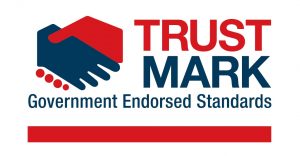 As TrustMark nears a close on its 10th Anniversary year, we nostalgically look back on how we got to this point. This year we’ve been campaigning heavily to promote reputable tradespeople, and shone light into the daily activities of our ten TrustMark Ambassadors, all of whom excel in customer service, trading practices and standards of workmanship.
As TrustMark nears a close on its 10th Anniversary year, we nostalgically look back on how we got to this point. This year we’ve been campaigning heavily to promote reputable tradespeople, and shone light into the daily activities of our ten TrustMark Ambassadors, all of whom excel in customer service, trading practices and standards of workmanship.
Our ambassadors have been involved in a range of activities this year to promote reputable traders. They started off by being featured in our anniversary report which you can download here. This looks at their business practices, ethos and how they stay true to their customers. We’re proud to work with them to change the industry stereotype and instil confidence in customers that by looking for the right indicators you can find truly professional tradespeople.
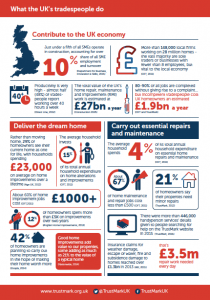 Firms have come a long way from the commonly branded ‘cowboy’ brush that they are still tarnished with. This year alone, we’ve seen a huge drive to change this unfair image. We released an infographic at the start of this year with some keys statistics on how much UK tradespeople contribute to the economy, which unveiled some astonishing figures. The repair, maintenance and improvement sector alone is worth £2.7 billion every year, so the work carried out by tradespeople has a huge impact on the UK economy.
Firms have come a long way from the commonly branded ‘cowboy’ brush that they are still tarnished with. This year alone, we’ve seen a huge drive to change this unfair image. We released an infographic at the start of this year with some keys statistics on how much UK tradespeople contribute to the economy, which unveiled some astonishing figures. The repair, maintenance and improvement sector alone is worth £2.7 billion every year, so the work carried out by tradespeople has a huge impact on the UK economy.
We’re proud to call ourselves a Social Enterprise Mark Holder. We’ve held the Mark for five years already, so we understand how much value it adds to a business such as ours. As a not-for-profit social enterprise, we put the interests of our Registered Firms and their customers at the heart of our business, and having a symbol that recognises this is important as consumers know that we aren’t focused on purely commercial gains.
Naturally, we aim to stay competitive, but in a way that benefits society and the construction industry. To us, the Mark shows businesses we have their best interests at heart, and we’re not just another scheme trying to make money. Social Enterprise Mark CIC are committed to ensuring the social enterprise business model remains ethical, credible and commercial through accreditation.
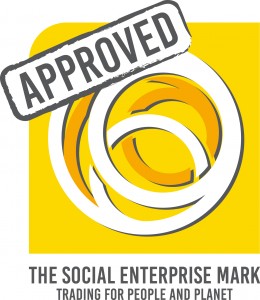 All organisations awarded the Social Enterprise Mark accreditation have one key quality in common: their main aim is to use income and profits to benefit society, rather than individuals such as business owners or shareholders. As the only social enterprise accreditation that is internationally available, we see it as a distinctive sign of quality and reassurance to consumers. It is also re-assessed on an annual basis, to ensure businesses are maintaining a fair approach and keep consumer interests at the core of activity.
All organisations awarded the Social Enterprise Mark accreditation have one key quality in common: their main aim is to use income and profits to benefit society, rather than individuals such as business owners or shareholders. As the only social enterprise accreditation that is internationally available, we see it as a distinctive sign of quality and reassurance to consumers. It is also re-assessed on an annual basis, to ensure businesses are maintaining a fair approach and keep consumer interests at the core of activity.
As a social enterprise, we don’t have a big marketing budget to play around with, so for TrustMark as an organisation we focus on spreading the word organically and adding value to our firms and their customers in any way we can in order to grow and stay competitive. Being a Social Enterprise Mark holder sends a message to firms that we are a professional organisation, and we feel that such affiliations attract the right sort of firms to become TrustMark registered. It’s important in this day and age to give a platform for quality, expert people to sell themselves with the recognition they deserve.
Within our big drive this year to promote professionals in the industry and add credibility to their businesses, we’ve set about a number of initiatives, to expand on the work with our Ambassadors and offer easier ways of staying professional to all of our Registered Firms.
One of the ways we looked to do this way by launching a new feedback system earlier this year to add value to traders on the TrustMark website. We see online reviews as a real sign of quality, and is obviously a great way for these firms to prove their worth to new customers who might not be familiar with their standards of workmanship. We try to encourage our firms to request reviews from all customers, even those that might have had some hiccups along the way. Reviews are often criticised for their inability to distinguish between real and fake, but with this new system in place, we are going the extra mile to ensure reviews are genuine. All customers leaving a review will have their review moderated by Referenceline to ensure they are genuine customers, and are not denied the right to leave a review by the firm.
We’re now looking to 2017 and how we can continue to add value to our Registered Firms so that they can pass this on to their customers. We’ll soon be launching a National Trading Standards Approval scheme – so this is something to look forward to seeing in the New Year!
Post truth and post authenticity?
I write this on a day when Donald Trump has been announced as President Elect of the USA. There are many questions being asked and much soul searching for answers to them. Amongst others – are we in a post truth era or an era that wants to kick over the traces of corporate and institutional power that have bypassed them? One thing is for sure, it has been very difficult to see the truth from the myths and the authenticity of the message.
A lack of transparency and clarity from leaders and commentators regarding the business model has also been a feature of social enterprise too for as long as I can remember. This has served a purpose; to pump-up the sector in terms of size and diversity without asking too many questions. It has also served a small number of well-connected social enterprises that know and can milk the system, which has led to the development of opaque business models that have benefited from the patronage of government and support programmes, e.g. Social Impact Bonds and the advent of Social Investment.
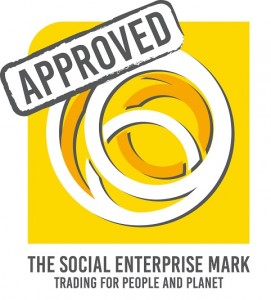 It was partly for this reason that we set up the Social Enterprise Mark as a project 9 years ago, and 3 years later as a business in its own right. We now have the longest pedigree and experience of social enterprise accreditation in the world and are indeed seen as leaders, with international academics and experts looking to us for our expertise in this field, e.g. British Council in China. Social enterprises outside the UK have also decided that they wish to accredit directly through our process, e.g. Fairtrade Labelling Organisation (FLOCERT). This proves that there is an appetite for being seen as different and being able to prove it credibly.
It was partly for this reason that we set up the Social Enterprise Mark as a project 9 years ago, and 3 years later as a business in its own right. We now have the longest pedigree and experience of social enterprise accreditation in the world and are indeed seen as leaders, with international academics and experts looking to us for our expertise in this field, e.g. British Council in China. Social enterprises outside the UK have also decided that they wish to accredit directly through our process, e.g. Fairtrade Labelling Organisation (FLOCERT). This proves that there is an appetite for being seen as different and being able to prove it credibly.
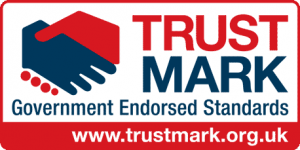 We can draw an analogy to TrustMark, a Social Enterprise Mark Holder, which evolved in response to concerns in the building sector. It is a government-endorsed accreditation scheme for trades in and around the home, providing reassurances that businesses must regularly stand up to scrutiny to.
We can draw an analogy to TrustMark, a Social Enterprise Mark Holder, which evolved in response to concerns in the building sector. It is a government-endorsed accreditation scheme for trades in and around the home, providing reassurances that businesses must regularly stand up to scrutiny to.
Social Enterprise Mark CIC had an original mandate from our sector to provide a similar service in the UK, verifying businesses who are genuine social enterprises.
We have learned, from the experiences of Fair Trade, of the importance of having a status that could confer genuineness and authenticity. At the time many different models were banded about, e.g. self-certification, CSR marks, membership bodies etc. We were clear that certifying authenticity can only be achieved through independence (the certification panel) and with transparency (application of the criteria consistently). This is why we operate as an independent CIC and not a membership body. Membership bodies depend upon and exist to promote the interests of their paying members, and through their sector – a potential conflict of interest.
We take our customers and accreditation very seriously and have built the value added to ensure that our accreditation does not stand still and is really clear to the outside world – for example, developing social value declarations to help demonstrate the commitment that all social enterprises should have to making a positive difference for people and planet, as well as the Social Enterprise Gold Mark as an indicator of business excellence.
The term “accreditation” may be used to distinguish a system of certification that actually seeks evidence in confirmation of an organisations credentials. The Social Enterprise Mark has always done this and we are 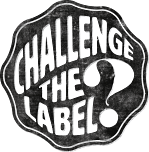 currently working with international sustainability standards, established by ISEAL, to help align our Marks with best practice models of accreditation. Whenever you see the term “certified”, ISEAL encourage people to “challenge the label”; to consider a few critical questions that help determine what that certification is really worth.
currently working with international sustainability standards, established by ISEAL, to help align our Marks with best practice models of accreditation. Whenever you see the term “certified”, ISEAL encourage people to “challenge the label”; to consider a few critical questions that help determine what that certification is really worth.
In striving for the best practice in accreditation, we have been and will continue to consult Mark Holders (and the wider sector). Our aim is to continue to provide a certification process that offers genuinely credible accreditation, one that social enterprises can take pride in and learn to improve from the world over.
Cash cows and money milking
The public and press have short memories. Today and over the last few weeks there has been flurry of scandal and comment about corporate greed. Even the right wing press are shouting about how BHS has been asset stripped, leaving a huge pensions hole. From offshore accounts and tax evasion, to BP paying a huge bonus to their CEO (despite huge losses being made by the company), the prevailing behaviour seems to be keep milking as much shareholder profit out, pay very little tax and forget thinking or caring about the consequences and who it affects.
A magnifying glass is held up to this sort of behaviour whilst it’s top of the news agenda, but it soon goes back to business as usual. There is no consistency in reporting either. One day there will be exposure of corporate greed in delivery of public services and the next day that company will be telling the business pages what a great job it does in valuing its employees and customers – maybe the figurehead head becomes another government ‘business czar’ – and getting CSR awards to boot?!
It doesn’t have to be like this though. If social enterprise was seen as a viable alternative, not just a niche, do-gooding, market failure option then perhaps we would get somewhere! Instead we forever seem to be hidebound by the current business orthodoxy of business schools the world over; ‘business is there to make money for its shareholders’.
This is why we get into problems with arguments about lack of investment too. The orthodoxy is that it’s hard to expand unless you can attract equity providers. However, as a famous local business person told me, ‘this is the equivalent of selling the family silver’. It means that you are at the behest of the equity stakeholders and even if they own a small proportion they are likely to influence in a purely commercial direction as their role is one of primarily making money. The wider social value of the business comes second.
What we need is a radically different business model that is seen as mainstream, not marginal. I don’t think that this is Corporate Social Responsibility. Rather it’s about truly putting people first. The old co-operatives of the last century were the centre of their community, because they were owned by the people that lived there. They were first and foremost about serving the locality, not making a fast buck and running.
There are those out there that share this ideal and business model that are not just niche; they are a substantial part of the economy. Universities, colleges, theatres, arts groups, membership bodies, sports clubs, unions – they all have a strong social mission but operate in many cases as businesses. They are our allies and we should be working together more closely to present a vision of what we want business to look like, not what business dictates to us.
Our conference in June, entitled ‘Standing up to Scrutiny’ will look in more detail at how we can work together to promote social enterprise as a credible and sustainable business model for the future. We will discuss the importance of accreditation and standards systems, and how these can help social enterprises to measure, demonstrate, and report on their social impact. Please click here for more information and to book your ticket.
Why talking about ‘what is a social enterprise?’ is still important
By Gareth Hart, Co-founder of Iridescent Ideas
“So you’re a social enterprise, eh? What does that mean then?” How many times have you been asked that question? How many times have you answered it but still aren’t convinced that they questioner has ‘got it’ or believes it?
The debate about the definition of social enterprise may well seem jaded and old news to those of us within the social enterprise community but it seems that a large proportion of the general public didn’t even realise there had been a debate going on. So, the aforementioned question comes up time and time again. If we want to establish new audiences for social enterprise and push the concept into a wider public consciousness it is vitally important to maintain a public dialogue about ‘what is a social enterprise’.
No one really seems to question you in the same way if your business is a charity or Fairtrade or eco-friendly. There is an automatic assumption these are ‘good’ things. People know what these terms mean. They come with a nice badge, logo or number that tells the public they’ve been checked out and do indeed do what they say on the tin. If only there was a similar thing available to social enterprises…
 Enter the Social Enterprise Mark. The Mark is the social enterprise equivalent of the Fairtrade logo or the Charity Commission number. The Social Enterprise Mark provides:
Enter the Social Enterprise Mark. The Mark is the social enterprise equivalent of the Fairtrade logo or the Charity Commission number. The Social Enterprise Mark provides:
- A clear definition of what constitutes a social enterprise
- An instantly recognisable ‘stamp of approval’ to show that your business has been independently assessed and meets criteria to justifiably call itself a social enterprise
- A national community of like-minded ethical businesses for social enterprises to engage with
- A range of other benefits around marketing and support
There is growing interest in the Social Enterprise Mark, particularly among large organisations like universities. Plymouth University was the first social enterprise university and has held the Mark since 2012. Many of the large health spin-outs also hold the Mark. These organisations provide services to huge numbers of people and have strong roles in public life in their respective towns, cities and areas. I would like to see more large healthcare providers really engage with the public around understanding that they are receiving great services from a local social enterprise. The Mark could help them do this.
As the social enterprise sector, and public awareness of it, continues to grow, so I hope that the Social Enterprise Mark will continue to flow into public consciousness and eventually become as recognisable as the Fairtrade logo. The Mark will evolve, I am sure, and we need an ongoing dialogue about what it means to be a social enterprise both within and outside the sector.
With the introduction of the Social Value Act in 2013 there is a requirement for social value and impact to be given more weight within commissioning of services. Consumers are looking to purchase ethical goods and for businesses to behave better. Surely then, the time is right for the Social Enterprise Mark to become a stamp of social value so that commissioners and customers alike will recognise social enterprises and be able to make more informed choices about the goods and services they buy and use.
I believe that social enterprises are better for the economy and for society. We need to articulate more clear what ‘better’ looks like of course. Social enterprises create wealth and jobs and also deliver environmental and social value. The Mark can be the guarantee that proves this.
Originally published on Iridescent Ideas blog, 2nd September 2015
Helping to create winning or better social enterprises?
I recently stumbled upon an American blog which talks about whether competitions are good for social enterprises. They are indeed all the rage – from social enterprise ‘Dragon’s Den’ style pitches, to ‘Social Enterprise of the Year’ awards. However, are they really what social enterprise is about, and do they really tell us about whether that business is genuinely applying good practice?
Objections to competitions could include:
- They offer a ‘flash in the pan’ snapshot view that doesn’t represent the long hard graft that goes into making a social enterprise work
- What about those who don’t win – is it too much about winners and losers? Does it leave a bad taste for those that don’t win?
- Is collaboration better than competing?
![]() For me, competitions represent a snapshot in time and do have their place – for example, we are currently running the Making a Mark competition to celebrate the vast and diverse social benefits created by Social Enterprise Mark holders.
For me, competitions represent a snapshot in time and do have their place – for example, we are currently running the Making a Mark competition to celebrate the vast and diverse social benefits created by Social Enterprise Mark holders.
However, what competitions do not do is to tell you much about the social enterprise beyond the moment they were judged, or indeed the openness and transparency of competition process. It’s up to whoever the judges are on the day.
Accreditation however offers something quite different. The Social Enterprise Mark for example, is both a tool of business differentiation, and a tool to demonstrate that those who have it have proved how they are making society a better place. There are no losers if you make the accreditation standard consistent and transparent, and our independent Certification Panel ensures this. The Mark provides a guarantee year on year, for both customers and partners, due to the annual reassessment process. Our Social Enterprise Gold Mark goes further, to prove that the best attributes of social enterprise are being applied across the business, and further developed and improved upon over time.
Therefore, we are not just talking about a single snapshot in time, but rather a social enterprise that can prove its social and enterprise attributes on an ongoing basis.
There is more ‘greenwash’ going on than ever before, as businesses realise the benefits of playing the social value and sustainability game. Which is precisely why we, as social enterprises, need to stand up to scrutiny and be open and transparent about what our motivations really are. This is where Social Enterprise Mark accreditation can provide the solution!
 The Mark provides an independent guarantee that an organisation has been through a robust assessment process, and is proven to be trading for people and planet. This is the crucial differentiator, and distinguishes social enterprises’ core motivation for being in business, which sets them apart from standard business models, where the key motivation is often to maximise profits for shareholders.
The Mark provides an independent guarantee that an organisation has been through a robust assessment process, and is proven to be trading for people and planet. This is the crucial differentiator, and distinguishes social enterprises’ core motivation for being in business, which sets them apart from standard business models, where the key motivation is often to maximise profits for shareholders.
‘Standing up to Scrutiny’ is the theme of our conference this year, and the event will focus on why it’s important to prove what we are and how we are doing it. We will consider the importance of accreditation and standards systems, and how these can help social enterprises to measure, demonstrate, and report on their social impact, therefore enabling them to stand out from the crowd.
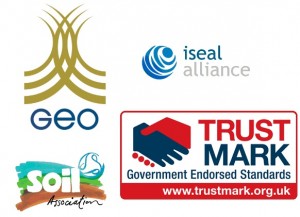 We are pleased to be welcoming a panel of speakers from accreditation and standards setting authorities across a range of sectors, which should provide interesting and diverse perspectives on the importance of such systems.
We are pleased to be welcoming a panel of speakers from accreditation and standards setting authorities across a range of sectors, which should provide interesting and diverse perspectives on the importance of such systems.
The conference is being kindly hosted by Social Enterprise Gold Mark holder University of Salford at MediaCityUK on 8th and 9th June 2016. Earlybird tickets are available to book online from just £50 + VAT.

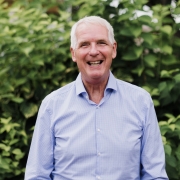
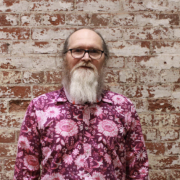 Gareth Hart Iridescent Ideas CIC
Gareth Hart Iridescent Ideas CIC